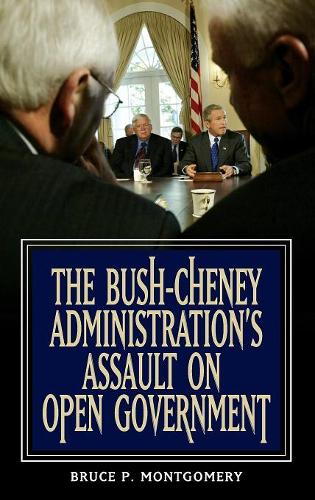
The Bush-Cheney Administration's Assault on Open Government
(Hardback)
Available Formats
Publishing Details
The Bush-Cheney Administration's Assault on Open Government
By (Author) Bruce P. Montgomery
Bloomsbury Publishing PLC
Praeger Publishers Inc
28th February 2008
United States
Classifications
Tertiary Education
Non Fiction
Constitutional and administrative law: general
320.973
Physical Properties
Hardback
232
Description
The Bush-Cheney administration took office in 2001 determined to assert the preeminent authority of the executive branch and its immunity from congressional oversight and public transparency. Within months, Congress's Use of Force resolution on the heels of the 9/11 terrorist attacks gave the White House the platform for launching an aggressive and successful campaign to gut the nation's open government laws, neuter congressional prerogatives, and shroud the presidency in privilege and secrecy. With military precision, the wartime executive targeted and struck down or flouted all the landmark sunshine laws enacted by Congress over the preceding decades. With military precision, the wartime executive targeted and struck down or flouted all the landmark sunshine laws enacted by Congress over the preceding decades: DT Freedom of Information Act (1966) DT Presidential Records Act (1978) DT Budget and Accounting Act establishing the General Accountability Office (1921) DT Federal Advisory Committee Act (1972) DT Federal Intelligence Surveillance Act (1978) Montgomery, who founded the world's largest academic repository of contemporary human rights documents, concludes with a summary of the aggregate impact of Bush-Cheney's attacks on open and balanced government and their implications for the future of constitutional and human rights in the United States.
Reviews
Montgomery outlines how the Bush-Cheney administration has shielded the federal government from public inspection by curtailing access to information under the Freedom of Information Act (FOIA), obstructed access to presidential records, invoked national security for keeping secrets, and conducted wiretaps without warrants. . . . Montgomery illustrates how the Bush-Cheney administration used executive privilege and prerogatives to circumvent open government laws. Recommended. * Choice *
Author Bio
BRUCE P. MONTGOMERY is Associate Professor and Faculty Director of Archives at the University of Colorado at Boulder. He is the founding director of the UCB Human Rights Initiative and a founding member of the International Federation of Human Rights Centers and Archives. He has served as an analyst of classified documents for the U.S. government. He is the author of Subverting Open Government: White House Materials and Executive Branch Politics. Articles by Montgomery on this topic have appeared in many journals and newspapers, including Presidential Studies Quarterly and the Washington Post.
